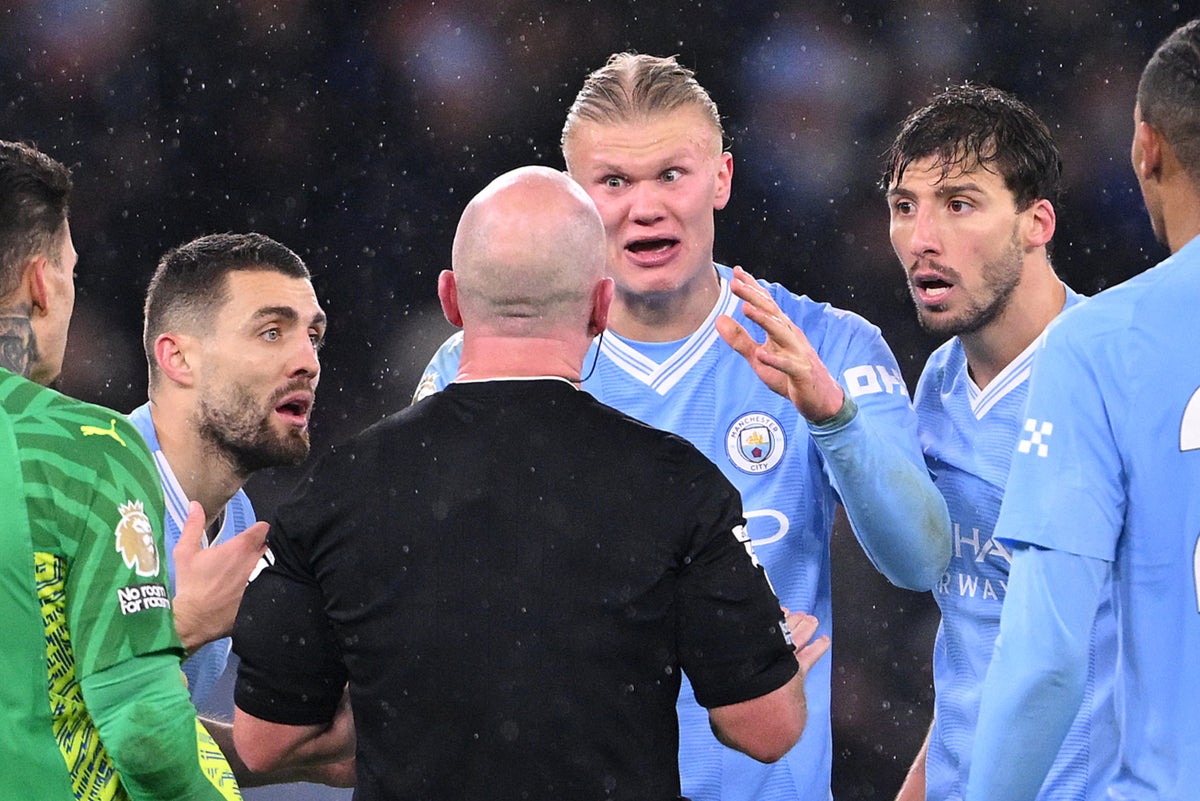
I knew I was a bit of a loser at primary school, but I never appreciated just how much until I remembered something about my school years recently. Whenever there was a break time kick-about, I always enthusiastically volunteered to be the referee. Nobody asked for this to happen. I just instinctively thought this was how I wanted to spend my break time. I didn’t have the black shorts, but I think I had a whistle. I did definitely have a pair of homemade red and yellow cards – wrapped in thick walls of gunky Sellotape by way of a waterproof laminator – so committed was I to keeping order and upholding the rules. It’s as though, from the age of nine, I’ve wanted people to shout “who’s the w****r in the black?”. In some ways, it was great training for becoming an opinionated columnist with a lively comments section.
To be clear, I’ve never, ever been a football fan. I just really like the idea of someone being fair and impartial, laying down the law when need be and then quietly (and slightly romantically) just getting on with it amid a torrent of chaos. Oddly there was quite a lot of respect for referees in my house growing up too. My dad’s primary school headteacher in Ilford, Essex, was referee extraordinaire Ken Aston, who officiated many great matches, including the 1962 World Cup. He was also the man who single-handedly invented the red and yellow card system, linesman’s flags, as well as making refs switch from wearing tweed (yes, apparently they used to wear tweed) to the familiar black and white.
All of this explains why it crushes me to see referees undergo agony all year round, either on or off the pitch. Seeing Man City’s Erling Haaland erupt at referee Simon Hooper last week, for example, felt tragically commonplace, just like the sustained criticism from Arsenal manager Mikel Arteta, who mocks referee’s hand gestures from the touchlines and endlessly trashes their decisions in the press conference. In fact, just last night a Turkish referee was punched by club president Faruk Koca after his club conceded an equaliser in the 97th minute.
The toll all this takes adds up, but it’s seldom we hear from referees about their actual lived experiences. A BBC survey from a few years ago of 2,000 referees from the grassroots to the professional leagues found that 22 per cent of refs were verbally abused during every match, while six out of 10 expected to be abused every match or two. Nearly one in five had suffered physical violence at the hands of players, including incidents of hospitalisation and criminal charges being pressed against players.
What I found most affecting, as a parent, was the decision of top flight Rugby Union referee Tom Foley to quit last week, citing the torrent of abuse he received on social media after officiating at last October’s World Cup final. The abuse went so deep that not only were his children targeted, he even had to contact their school about the threats he was receiving. All for what exactly – a game of throw the big egg?
I’ve always believed that if you’ve personally experienced bullying – maybe at school, because you used to habitually prance about brandishing sticky homemade red and yellow cards – then you can spot bullying in any context a mile off. So when a manager like Jose Mourinho wages an ongoing campaign against a specific referee like Anthony Taylor, as he has done since 2013 (coming to a head this year when he was banned for four matches after confronting Taylor in a garage after a match), you know that the ref is experiencing nothing short of workplace bullying. Yet the authorities cravenly tolerate it. When Uefa let an unceasing rule-breaker such as Mourinho constantly get away with it, a message is beamed into society that we don’t care about objective officials.
All of this creates a looming crisis for football. In August this year, Uefa’s Roberto Rosetti bluntly declared in a presentation: “We need referees!”. The same sentiment is expressed in an incredibly charming British documentary film from earlier this year called In the Middle, which focuses on the lives of grassroots refs. “None of the young ones stay,” a veteran official bemoans at one point.
‘The most visible and high-profile adjudicators in society – football referees – have been allowed to become figures of hate and derision’— (iStock)
But beyond football and sport in general, a greater problem exists. The job of being a neutral and impartial person upholding rules is unglamorous, hated by almost all and yet incredibly necessary for society to function at a basic level. We tend to love rules and the concept of fairness, except when someone actually tries to implement them on us.
Teachers, journalists, and a host of civic officials increasingly suffer from an almost banal and instinctive hatred of authority and officialdom that exists, I think in part, because the most visible and high-profile adjudicators in society – football referees – have been allowed to become figures of hate and derision.
Amazingly, according to The FA’s website, you can start to be a referee aged 14, which is either a genius idea (surely even the coldest manager wouldn’t lay into someone that young, right?) or just a recipe for disaster. It’s depressingly easy to imagine a game as well-funded as football slowly leaning into a fully automated system of AI ref bots that can passively take the abuse. But until then, all I can hope is that the game implements a form of jury service, where fans are mandated to trudge out on a cold Sunday morning and officiate a grassroots game of 22 big grown men who might variously be hungover, stressed out by a new baby or struggling to pay the bills, just once in their lives. Surely that would silence even the most vociferous trolls and backseat know-it-alls for good.







